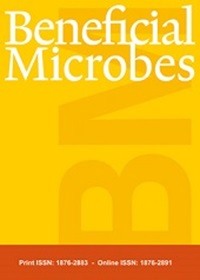益生菌配方在肠道中产生 GABA:体外研究
IF 3.1
4区 医学
Q2 MICROBIOLOGY
引用次数: 0
摘要
本研究旨在通过批量培养和体外肠道模拟实验,评估益生菌配方对结肠不同部位神经活性化合物产生的影响。研究人员对 13 种乳酸菌株进行了体外生产神经递质能力的鉴定,这些菌株分别属于 Levilactobacillus brevis、Lactiplantibacillus plantarum、Lacticaseibacillus paracasei、Ligilactobacillus salivarius 和 Streptococcus thermophilus。根据它们在体外产生γ-氨基丁酸(GABA)和乙酰胆碱的能力,选择了L. brevis P30021和L. plantarum P30025。制备了一种具有潜在精神生物活性的益生菌配方,并在人类微生物群的批量培养中对其进行了测试,以监测 GABA 和乙酰胆碱的形成。从人体肠道微生物群模拟器(SHIME®)中采集了三个结肠的样本,通过 LC-MS 评估 GABA 和其他神经递质的生成情况。还通过气相色谱测定了短链脂肪酸(SCFA),并通过 16S rRNA 基因测序测定了微生物群的组成。在体外批量发酵过程中,补充益生菌会导致 GABA 和乙酰胆碱的形成,同时谷氨酸浓度下降。经益生菌处理后产生的 GABA 在 SHIME® 短期实验中得到证实。发酵 72 小时后,短链脂肪酸没有出现差异。在结肠的三个不同部位发现了不同的微生物群组成,其中升结肠血管中的 Veillonellaceae 数量较多。暴露于益生菌的微生物群显示出较高水平的 Bacteroides,这是一种具有抗炎活性的肠道微生物,也是一种潜在的 GABA 生产者。结果表明,测试的益生菌配方对肠道微生物群结构和 GABA 的产生有影响。总之,益生菌治疗改变了微生物群的组成,并增加了神经活性代谢产物的产生,这表明益生菌作为精神生物制剂具有广阔的潜力,尽管还需要进一步的临床证据来证实这些益生菌在改善精神健康方面的有效性。本文章由计算机程序翻译,如有差异,请以英文原文为准。
Gut production of GABA by a probiotic formula: an in vitro study
The objective of this study was to evaluate the influence of a probiotic formula on the production of neuroactive compounds in different parts of the colon in batch culture and in vitro gut simulator experiments. Thirteen lactic acid bacterial strains, belonging to the species Levilactobacillus brevis, Lactiplantibacillus plantarum, Lacticaseibacillus paracasei, Ligilactobacillus salivarius, Streptococcus thermophilus, were characterised for their in vitro ability to produce neurotransmitters. L. brevis P30021 and L. plantarum P30025 were selected based on their capability to produce γ-aminobutyric acid (GABA) and acetylcholine in vitro. A probiotic formulation with potential psychobiotic activity was prepared and tested in a batch culture of human microbiota monitoring the formation of GABA and acetylcholine. Samples of the three colonic tracts were taken from the Simulator of the Human Intestinal Microbiota (SHIME®) evaluating the production of GABA and other neurotransmitters by LC-MS. Short chain fatty acids (SCFA) by GC and microbiota composition by 16S rRNA gene sequencing were also determined. Probiotic supplementation led to the formation of GABA and acetylcholine with a decrease in glutamate concentrations in the in vitro batch fermentation. Production of GABA after the treatment with probiotics was confirmed in the SHIME® short-term experiment. No differences in short-chain fatty acids were observed up to 72 h of fermentation. Different microbiota composition was found in the three different parts of the colon, with a higher abundance of Veillonellaceae in the ascending colon vessels. The probiotic-exposed microbiota showed higher levels of Bacteroides, a gut microbe associated with anti-inflammatory activities and a potential GABA producer. Results demonstrate the impact of the tested probiotic formula on gut microbiota structure and GABA production. In conclusion, the probiotic treatment changed the microbiota composition and increased neuroactive metabolites production, indicating promising potential as psychobiotics, even if further clinical evidence is needed to confirm the effectiveness of these probiotics in improving mental health.
求助全文
通过发布文献求助,成功后即可免费获取论文全文。
去求助
来源期刊

Beneficial microbes
MICROBIOLOGY-NUTRITION & DIETETICS
CiteScore
7.90
自引率
1.90%
发文量
53
审稿时长
>12 weeks
期刊介绍:
Beneficial Microbes is a peer-reviewed scientific journal with a specific area of focus: the promotion of the science of microbes beneficial to the health and wellbeing of man and animal. The journal contains original research papers and critical reviews in all areas dealing with beneficial microbes in both the small and large intestine, together with opinions, a calendar of forthcoming beneficial microbes-related events and book reviews. The journal takes a multidisciplinary approach and focuses on a broad spectrum of issues, including safety aspects of pro- & prebiotics, regulatory aspects, mechanisms of action, health benefits for the host, optimal production processes, screening methods, (meta)genomics, proteomics and metabolomics, host and bacterial physiology, application, and role in health and disease in man and animal. Beneficial Microbes is intended to serve the needs of researchers and professionals from the scientific community and industry, as well as those of policy makers and regulators.
The journal will have five major sections:
* Food, nutrition and health
* Animal nutrition
* Processing and application
* Regulatory & safety aspects
* Medical & health applications
In these sections, topics dealt with by Beneficial Microbes include:
* Worldwide safety and regulatory issues
* Human and animal nutrition and health effects
* Latest discoveries in mechanistic studies and screening methods to unravel mode of action
* Host physiology related to allergy, inflammation, obesity, etc.
* Trends in application of (meta)genomics, proteomics and metabolomics
* New developments in how processing optimizes pro- & prebiotics for application
* Bacterial physiology related to health benefits
 求助内容:
求助内容: 应助结果提醒方式:
应助结果提醒方式:


